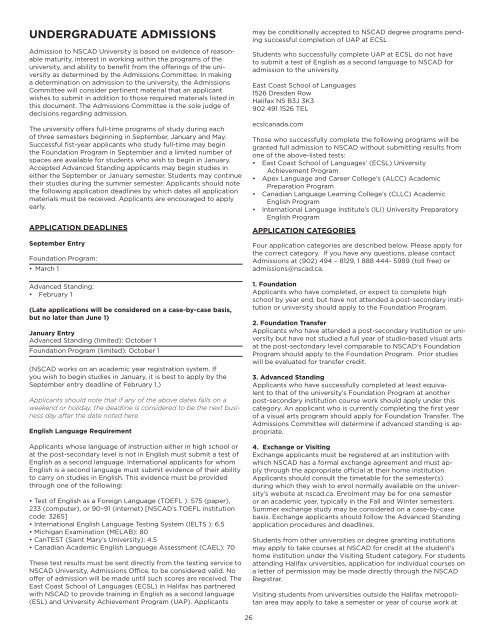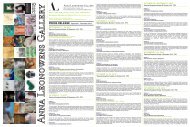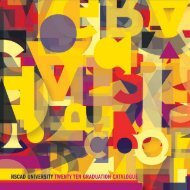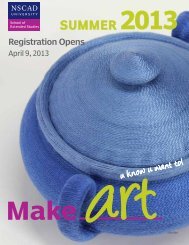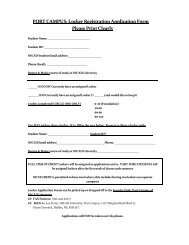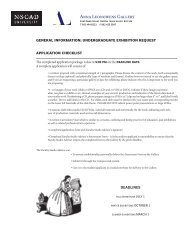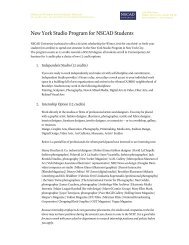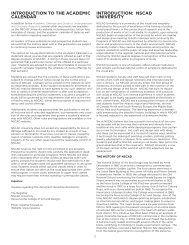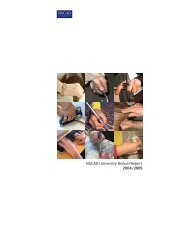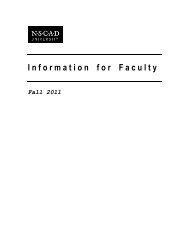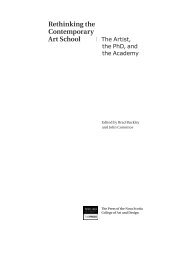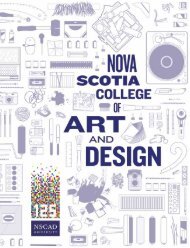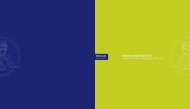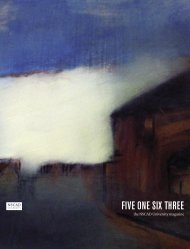CONTENTS - Nova Scotia College of Art and Design
CONTENTS - Nova Scotia College of Art and Design
CONTENTS - Nova Scotia College of Art and Design
Create successful ePaper yourself
Turn your PDF publications into a flip-book with our unique Google optimized e-Paper software.
UNDERGRADUATE ADMISSIONS<br />
Admission to NSCAD University is based on evidence <strong>of</strong> reasonable<br />
maturity, interest in working within the programs <strong>of</strong> the<br />
university, <strong>and</strong> ability to benefit from the <strong>of</strong>ferings <strong>of</strong> the university<br />
as determined by the Admissions Committee. In making<br />
a determination on admission to the university, the Admissions<br />
Committee will consider pertinent material that an applicant<br />
wishes to submit in addition to those required materials listed in<br />
this document. The Admissions Committee is the sole judge <strong>of</strong><br />
decisions regarding admission.<br />
The university <strong>of</strong>fers full-time programs <strong>of</strong> study during each<br />
<strong>of</strong> three semesters beginning in September, January <strong>and</strong> May.<br />
Successful fist-year applicants who study full-time may begin<br />
the Foundation Program in September <strong>and</strong> a limited number <strong>of</strong><br />
spaces are available for students who wish to begin in January.<br />
Accepted Advanced St<strong>and</strong>ing applicants may begin studies in<br />
either the September or January semester. Students may continue<br />
their studies during the summer semester. Applicants should note<br />
the following application deadlines by which dates all application<br />
materials must be received. Applicants are encouraged to apply<br />
early.<br />
APPLICATION DEADLINES<br />
September Entry<br />
Foundation Program:<br />
• March 1<br />
Advanced St<strong>and</strong>ing:<br />
• February 1<br />
(Late applications will be considered on a case-by-case basis,<br />
but no later than June 1)<br />
January Entry<br />
Advanced St<strong>and</strong>ing (limited): October 1<br />
Foundation Program (limited): October 1<br />
(NSCAD works on an academic year registration system. If<br />
you wish to begin studies in January, it is best to apply by the<br />
September entry deadline <strong>of</strong> February 1.)<br />
Applicants should note that if any <strong>of</strong> the above dates falls on a<br />
weekend or holiday, the deadline is considered to be the next business<br />
day after the date noted here.<br />
English Language Requirement<br />
Applicants whose language <strong>of</strong> instruction either in high school or<br />
at the post-secondary level is not in English must submit a test <strong>of</strong><br />
English as a second language. International applicants for whom<br />
English is a second language must submit evidence <strong>of</strong> their ability<br />
to carry on studies in English. This evidence must be provided<br />
through one <strong>of</strong> the following:<br />
• Test <strong>of</strong> English as a Foreign Language (TOEFL ): 575 (paper),<br />
233 (computer), or 90–91 (internet) [NSCAD’s TOEFL institution<br />
code: 3265]<br />
• International English Language Testing System (IELTS ): 6.5<br />
• Michigan Examination (MELAB): 80<br />
• CanTEST (Saint Mary’s University): 4.5<br />
• Canadian Academic English Language Assessment (CAEL): 70<br />
These test results must be sent directly from the testing service to<br />
NSCAD University, Admissions Office, to be considered valid. No<br />
<strong>of</strong>fer <strong>of</strong> admission will be made until such scores are received. The<br />
East Coast School <strong>of</strong> Languages (ECSL) in Halifax has partnered<br />
with NSCAD to provide training in English as a second language<br />
(ESL) <strong>and</strong> University Achievement Program (UAP). Applicants<br />
26<br />
may be conditionally accepted to NSCAD degree programs pending<br />
successful completion <strong>of</strong> UAP at ECSL .<br />
Students who successfully complete UAP at ECSL do not have<br />
to submit a test <strong>of</strong> English as a second language to NSCAD for<br />
admission to the university.<br />
East Coast School <strong>of</strong> Languages<br />
1526 Dresden Row<br />
Halifax NS B3J 3K3<br />
902 491 1526 TEL<br />
ecslcanada.com<br />
Those who successfully complete the following programs will be<br />
granted full admission to NSCAD without submitting results from<br />
one <strong>of</strong> the above-listed tests:<br />
• East Coast School <strong>of</strong> Languages’ (ECSL) University<br />
Achievement Program<br />
• Apex Language <strong>and</strong> Career <strong>College</strong>’s (ALCC) Academic<br />
Preparation Program<br />
• Canadian Language Learning <strong>College</strong>’s (CLLC) Academic<br />
English Program<br />
• International Language Institute’s (ILI) University Preparatory<br />
English Program<br />
APPLICATION CATEGORIES<br />
Four application categories are described below. Please apply for<br />
the correct category. If you have any questions, please contact<br />
Admissions at (902) 494 – 8129, 1 888 444- 5989 (toll free) or<br />
admissions@nscad.ca.<br />
1. Foundation<br />
Applicants who have completed, or expect to complete high<br />
school by year end, but have not attended a post-secondary institution<br />
or university should apply to the Foundation Program.<br />
2. Foundation Transfer<br />
Applicants who have attended a post-secondary Institution or university<br />
but have not studied a full year <strong>of</strong> studio-based visual arts<br />
at the post-sectondary level comparable to NSCAD’s Foundation<br />
Program should apply to the Foundation Program. Prior studies<br />
will be evaluated for transfer credit.<br />
3. Advanced St<strong>and</strong>ing<br />
Applicants who have successfully completed at least equivalent<br />
to that <strong>of</strong> the university’s Foundation Program at another<br />
post-secondary institution course work should apply under this<br />
category. An applicant who is currently completing the first year<br />
<strong>of</strong> a visual arts program should apply for Foundation Transfer. The<br />
Admissions Committee will determine if advanced st<strong>and</strong>ing is appropriate.<br />
4. Exchange or Visiting<br />
Exchange applicants must be registered at an institution with<br />
which NSCAD has a formal exchange agreement <strong>and</strong> must apply<br />
through the appropriate <strong>of</strong>ficial at their home institution.<br />
Applicants should consult the timetable for the semester(s)<br />
during which they wish to enrol normally available on the university’s<br />
website at nscad.ca. Enrolment may be for one semester<br />
or an academic year, typically in the Fall <strong>and</strong> Winter semesters.<br />
Summer exchange study may be considered on a case-by-case<br />
basis. Exchange applicants should follow the Advanced St<strong>and</strong>ing<br />
application procedures <strong>and</strong> deadlines.<br />
Students from other universities or degree granting institutions<br />
may apply to take courses at NSCAD for credit at the student’s<br />
home institution under the Visiting Student category. For students<br />
attending Halifax universities, application for individual courses on<br />
a letter <strong>of</strong> permission may be made directly through the NSCAD<br />
Registrar.<br />
Visiting students from universities outside the Halifax metropolitan<br />
area may apply to take a semester or year <strong>of</strong> course work at


